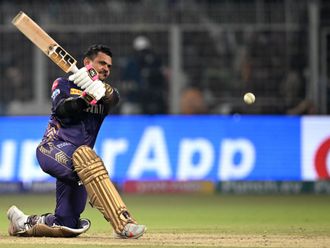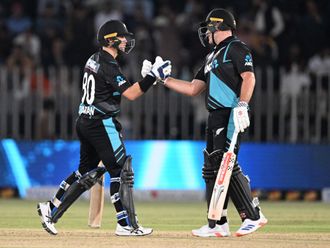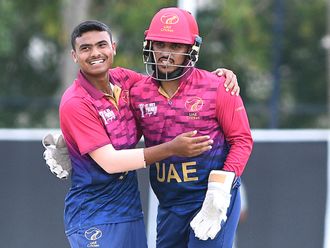London: Christopher Martin-Jenkins, known to millions of listeners of Test Match Special as “CMJ”, who died on Tuesday of cancer at the age of 67, was a front-rank cricket commentator for 40 years on radio and occasionally on television.
As a schoolboy he had written to the BBC commentator Brian Johnston to ask how he might follow in his path. Johnston took him to lunch and told him to keep playing and watching cricket, and whenever possible to practise commentating into a tape recorder.
He was to follow his mentor as cricket correspondent of the BBC, a job he performed for two separate spells, following those by being correspondent of the Daily Telegraph and the Times and editor of the Cricketer magazine. His retirement from the Times was followed by the presidency of MCC.
His great talent for mimicry, which started at school, made him an entertaining after-dinner speaker. It also carried him to the final auditions for the Cambridge University Footlights.
An able cricketer himself, he was disappointed not to win a blue at Cambridge, though he was a successful captain of his college, Fitzwilliam, and represented the Surrey second XI. He had a fierce pride in the achievements of his second son, Robin, as a first-class cricketer for Sussex.
His radio commentary style was detailed and meticulous, belying the affectionate reputation he built up on Test Match Special for absent-mindedness and lateness, trademark characteristics that he seemed sometimes to celebrate. Legendary also were his idiosyncratic curses, “Fotheringay Thomas!” or “Fishcakes and buttercup pie!”, whenever a minor crisis beset his life.
CMJ was born in Peterborough, the second of three sons of Dennis and Rosemary. His father worked for Ellerman Lines, the shipping firm, becoming its chairman and chief executive. His mother was a surgeon.
He attended St Bede’s prep school in Eastbourne, followed by Marlborough college and then Cambridge, where he read history and, apart from playing cricket, won two half-blues for rugby fives. It was at Cambridge that he met Judy Hayman, who became his wife in 1970. He graduated in 1967, having already been appointed by EW Swanton as deputy editor of the Cricketer magazine. Swanton was at that stage editorial director, leaving most of the nuts and bolts of producing the magazine to his deputy editor.
In March 1970 he left the Cricketer to join the BBC Radio Sports News department, under the editorial control of Angus Mackay, creator of Sports Report. When Mackay told him he would be introduced on the air as “Chris Jenkins”, CMJ told him that he would prefer his full name.
Sports Report brought in a new era of shorter reports on sporting events, following the more rambling and often unscripted “eyewitness accounts” that had gone before and CMJ proved adept at the style.
In 1972 he joined the Test Match Special team for the first One Day International to be played in England and the following year he commentated on his first Test match, against the West Indies at Lord’s. He remained part of the TMS team for every home season for the next 38 years.
At the end of the 1972 cricket season, Johnston retired from the BBC staff and his role as cricket correspondent and a year later, in time for England’s tour of the Caribbean, CMJ was appointed to succeed him. He held the post until 1981, when he returned to the Cricketer as full-time editor, while still doing radio and television cricket commentaries as a freelance.
He returned to the job of BBC cricket correspondent after three years, retaining the editorship of the Cricketer. In 1991 he was appointed cricket correspondent of the Telegraph and was succeeded at the BBC by Jonathan Agnew. In 1999 he moved from the Telegraph to become chief cricket correspondent at the Times, where he stayed until retirement from the staff in 2008.
His standing in the game of cricket led to his being the first non-professional player to be asked to deliver the annual MCC Cowdrey lecture on the theme of the spirit of cricket. To his surprise and delight, he was invited to become president of the MCC in 2010, though his year of office saw some uncomfortable acrimony over plans for the development of Lord’s.
His final illness was diagnosed after he had finished commentating for Test Match Special on the three Tests between Pakistan and England in the Gulf at the beginning of 2012, the year of the publication of his autobiography, CMJ — A Cricketing Life, which followed 25 other books he had written and edited.
He is survived by Judy, their two sons, James and Robin, and their daughter, Lucy.












